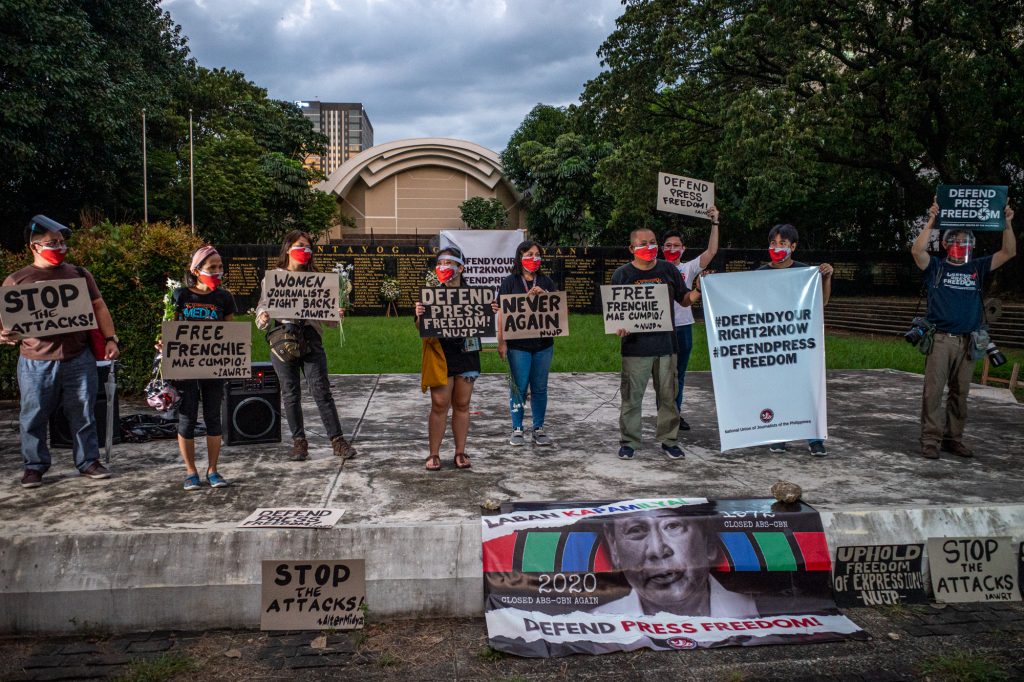
The National Union of Journalists in the Philippines launched a campaign on September 21 to support media practitioners who are being charged in court for their work or who are facing threats.
Dubbed “Masked Media” campaign, the activity aims to promote public awareness on the condition of press freedom in the country.
The launching of the campaign was held on the 48th anniversary of the declaration of martial law in the country in 1972.
Raymund Villanueva, deputy secretary general of NUJP, said media workers today are facing “the same forms of repressions and attacks.”
“Without the formal declaration of martial law, the present government is trying to control and silence the mass media like what the late dictator did in the 1970s,” he said.
Villanueva said the present administration has been advancing “massive disinformation” to discredit journalists in their “pursuit of truth, accountability, and transparency.”
During the launch, the group paid tribute to 16 journalists and media workers who fought the Marcos dictatorship, including Antonio Nieva, NUJP founder, and Jose Burgos Jr., founder of the alternative newspapers WE Forum, Malaya, and Tinig ng Masa.
In a statement, the NUJP said the campaign is not just a reminder of the dark years of media in the country but it also aims “to send out the message that today, we face the same renewed efforts by another government … to suppress freedom of the press and pervert the truth.”
Part of the “Masked Media” campaign is the selling of face masks with a red hand over a newspaper design and a phrase that says “Defend Press Freedom.”
The group said proceeds of the project will help fund the legal battle of journalists who are facing libel cases.
Len Olea of Bulatlat.com said at least 23 media personalities have been charged with libel, cyber libel, and other legal cases since President Rodrigo Duterte assumed power in July 2016.
She said the multiple charges against online news outfit Rappler and its founder Maria Ressa is an attempt to suppress freedom of expression.
“The shutdown of ABS-CBN, the largest broadcaster in the country, was also part of the government’s systematic plan to control and silence the mass media,” said Olea.
The NJUP reported that there were at least 17 journalists and media workers who have been killed since July 2016.
The most recent case was that of Jobert Bercasio, a reporter and commentator in Sorsogon City, south of Manila, who was killed on September 14.
Bercasio was killed one hour after he posted on his social media account that trucks were operating in a nearby quarry site without proper permits and documentation.
The Presidential Task Force on Media Security said the government considers “all forms of violence against journalists to be work-related” unless the results of investigations tell otherwise.
On September 20, Presidential Communications Operations Office Secretary Martin Andanar said the Philippine government has been working “to change the global stigma” placed on the Philippines as “one of the deadliest and worst places for journalists and media workers in the world” since 2016.
He said the creation of PTFoMS, an agency tasked to investigate and address violence against journalists is an initiative “that promotes media protection and rights.”
Andanar assured the public that the Duterte administration will continue to promote rights, freedom, and security of media workers.
“The freedom of expression and press freedom has never been and will never be curtailed by the Duterte administration,” he said.
Source: Licas Philippines
0 Comments